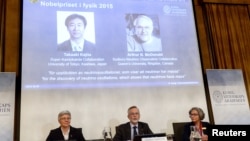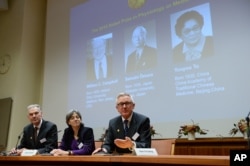The 2015 Nobel Physics prize has been awarded to Takaaki Kajita and Arthur MacDonald for their discovery of neutrino oscillations, which show that neutrinos — the second-most abundant particles in the universe, next to photons — have mass and change identities.
The Nobel Committee said the research done by Kajita, of the University of Tokyo, and MacDonald, of Queen's University, Canada, has changed the world's understanding of the innermost workings of matter.
According to the Standard Model of particle physics, a theory that explains the hundreds of fundamental particles that comprise the atoms that make up chemical elements and other particles, there are three types of neutrinos — electron-neutrinos, muon-neutrinos and tau-neutrinos.
In experiments designed to count the number of neutrinos that arrive from the sun, particularly electron-neutrinos, scientists found that up to two-thirds of the calculated amount was missing.
The research conducted by Kajita and MacDonald confirmed suspicion that neutrinos change from one identity to another while in the atmosphere and this metamorphosis requires them to have mass.
Breakthrough discovery
According to the Nobel Committee, this breakthrough has "revealed the first apparent crack" in the Standard Model.
"It has become obvious that the Standard Model cannot be the complete theory of how the fundamental constituents of the universe function," said the Nobel statement.
"The universe where we live in is still full of unknowns. A major discovery cannot be achieved in a day or two. It takes a lot of people and a long time. I would like to see young people try to join our pursuit of mystery solving," said Kajita at a press conference organized by his university.
MacDonald said scientists would still like to find the actual weight of neutrinos. Experiments are underway to investigate whether there are other types besides the three that have been observed.
On Monday, the Nobel Committee announced the prize winners for medicine: scientists from Ireland, Japan and China.
Other winners
William Campbell from Ireland and Satoshi Omura from Japan shared the prize for their discovery of a new therapy for infections caused by roundworm parasites.
And China's Tu Youyou discovered a drug that has significantly reduced the mortality rates for patients suffering from malaria, so she will also share in the prize.
Nobel Prizes are awarded each year in medicine, physics, chemistry, literature, peace, and economic sciences. The money comes from a bequest by Swedish inventor Alfred Nobel and the awards, in existence since 1901, have become a top achievement award in each field.
Winners are awarded a monetary prize that varies slightly from year to year. In 2015, the Physics prize is $963,000, to be divided equally between the winners. They also receive a medal and a Nobel "diploma."






